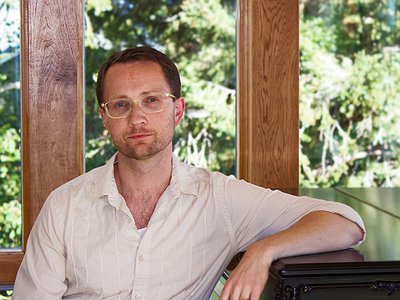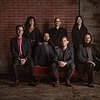Name: Sean Friar, asnwering for NOW Ensemble who is also Logan Coale, Mark Dancigers, Alicia Lee, Michael Mizrahi and Alex Sopp.
Nationality: American
Occupation: composer
Current Release: Before and After on New Amsterdam Records
Recommendation: Romanian philosopher Emil Cioran is described as the “most depressing” philosopher, but there’s something about the ravishing enthusiasm with which he excoriates humankind that I really get a kick out of / In the Alps by Richard Ayres. It’s hilarious, heartbreaking, inventive, and uncouth, all in a way that feels genuine and deeply felt.
If you enjoyed this interview with NOW Ensemble, visit their website to find out more.
When did you start composing - and what or who were your early passions and influences? What was it about music and/or sound that drew you to it?
I had my first piano lessons when I was three and was making little compositions almost from the beginning, most of them 12-bar blues. I was fortunate that I always had teachers who encouraged me to improvise, and there was never a clear boundary to me between playing piano and composing. Though most of my training has been classical, that’s not how I got into music: Jerry Lee Lewis and the Beach Boys were much bigger early influences on me than any classical composer.
I even dressed up as Lewis for Halloween, and a highlight of my young life was getting to do an impromptu performance of “Great Balls of Fire” with the popular 50s band, The Coasters, at an outdoor concert in Laughlin, NV. I was really excited by his showmanship, his virtuosity, and the directness and over-the-topness of his expression. Sometimes, classical music has a tendency to go in the opposite direction, cloaking itself in subtlety and artifice; a dose of Jerry Lee-style exuberance can serve it well! As for the Beach Boys, I loved and still love everything about their music – the harmony, the instrumentation (particularly on Pet Sounds and Smile), and the unique counterpoint that occurs between their melodies, harmonies, and basslines. The way their chords and basslines are put together in beautiful but not obvious ways definitely influences the way I write today.
For most artists, originality is preceded by a phase of learning and, often, emulating others. What was this like for you: How would you describe your own development as an artist and the transition towards your own voice?
For many years, my compositions were clear emulations of other composers or genres. I have early pieces written in the styles of so many of my favorite composers, and I learned a ton writing each one of them, especially the ones that didn’t work. Aside from emulation, I think it’s important for all composers – and especially ones just getting started – to periodically tug at the seams of their musical language and ask themselves “is there a reason I do this thing and don’t do that thing?” Sometimes, there are good answers but more often the boundaries we set up for ourselves are arbitrary, convenient, and untested. Sometimes, when you venture outside them, you find a good reason not to do it again (e.g., you’re not good at the thing you tried, or it just doesn’t feel like “you”), but other times, it will lead to a total transformation of the way you write that actually gets you closer to finding your voice.
How do you feel your sense of identity influences your creativity?
In grad school, I started to notice that developments in my musical language seemed to precede similar kinds of developments in my personality. I might get interested in the particular way musical ideas were interacting with each other, or the expression of certain kinds of emotions, and found that those interests spilled over into the rest of my life later on. I don’t find this so surprising, though: one’s intuition plays such a big role in composing that it seems natural that aspects of your identity might come out there before they show up in other domains of life.
Over time, I’ve found that my music and identity seem to reinforce each other, pushing the other to become more focused and profiled with time. Just as it has become clearer to me how I want to go about things in my life, it’s become clearer to me how to separate what I can do in a piece of music from what I feel I should do. I suppose a composer’s music has a tendency to become a caricature of their personality over time, which is a good thing at least as often as it’s bad.
What were your main creative challenges in the beginning and how have they changed over time?
One of the hardest things was separating what was a cool musical idea from an idea that actually belonged in the piece. At first, you’re just happy to come up with material that sounds good and it’s hard to also think about the big picture of what you’re expressing in the piece as a whole. When I was younger, this often meant that my pieces felt like a series of ideas that – perhaps good on their own – felt strung together without much obvious reason, resulting in the music being less than the sum of its parts. It’s a common young composer problem. One of the ways I challenged myself to work past that was by asking myself to describe the purpose of every section of music I wrote, even every phrase. “Why is this thing here? What is it doing to advance the cause of this section of the piece? Is it redundant, distracting, an unintended red herring? If so, get rid of it no matter how much you like it. No one will miss what they didn’t know was there.”
My main creative challenge now is probably the same one I’ll always have. Every musical idea has so many possible paths it can take, and just because I’m the composer who came up with the idea doesn’t mean I know everything it can do. There’s a degree of humility involved in recognizing that musical ideas can surprise even the one who wrote them. The creative challenge this translates into is that I always want to feel like I know the material I’m working with really well before I get started on the piece. I want to create a huge palette of possibilities for each little bit of music I’m working with, and that leads to a lot of thinking about and experimenting with my ideas before I actually get started writing the piece. I find that exploratory part of the process to be a lot of fun, though, so maybe it’s more of a time-consuming pleasure than a challenge.
Time is a variable only seldom discussed within the context of contemporary composition. Can you tell me a bit about your perspective on time in relation to a composition and what role it plays in your work?
Time is the most important aspect of music, for me. Pretty much everything else (harmony, melody, timbre, rhythm, form) is negotiable. Even the best musical material will fall flat on its face if the pacing is off, and totally unremarkable ideas can be made riveting when it feels like every change is happening exactly when it should.
The largest part of my composing time is devoted to trying to get things to feel like they take up the right amount of time. Even on the smallest of scales, pacing can make or break a moment: a silence that’s a second too short may not leave a listener enough time to feel suspense, disorientation, peace, or whatever it’s supposed to express; a silence that’s a second too long may cause a listener’s energy to slump and their mind to wander. While this might sound like I’m nitpicking at minutiae most people won’t notice, I think finding the right pacing for a given musical moment is crucial for it to speak strongly and clearly, to be the best version of itself. If all’s going well, a listener might never notice the pacing because everything just feels right.
How do you see the relationship between the sound; aspects of music and the compositional aspects? How do you work with sound and timbre to meet certain production ideas and in which way can certain sounds already take on compositional qualities?
I find these two things inseparable. Though we tend to divide music into discrete parameters (melody, harmony, timbre, etc.), the divisions are not nearly so clear. For example, we often think of harmony as a collection of notes in which each note has an equally important role in defining what the harmony is. But the volume and tone color of each of those notes can dramatically affect the perception of the harmony, weighing it more heavily toward some notes than others. It’s akin to thinking of harmony in two dimensions versus three or more. These kinds of grey areas exist between all aspects of music. I try to remind myself that there are always raw acoustic phenomena happening when music is being played in addition to whatever higher-lever “compositional” organization is being expressed. And those acoustic phenomena aren’t imperfections to be reduced but the lifeblood of sonic expression – they should be leaned into so that the music always has a dynamic, visceral quality to its surface. Thinking like this influence both the way I write for instruments and how I record and produce an album.
Collaborations can take on many forms. What role do they play in your approach and what are your preferred ways of engaging with other creatives?
There’s a big part of my compositional process in which I’m a hermit. I’ll compose as much as I can in a day, day after day, and it’s all quite private. But every bit as important is the part of the process where I get to work with musicians. My favorite mode of collaboration is to be able to bring lots of ideas-in-progress to a rehearsal and explore them together with the musicians, getting their feedback about ways to make things easier or better, trying out new ideas, and using those experiences to refine and sometimes reorient the piece. Though there are plenty of times where I just write a piece and deliver the finished product to the performers, having these playground sessions where we bounce ideas off each other while the music is in progress is always the most rewarding for me.
Something I love about the composing process is this balance of the egomaniacal and the humble. Admittedly, it’s exhilarating to feel you’ve created something from nothing and that, moreover, that something expresses an idea you don’t feel has been articulated that way before. On the other hand, I always remind myself that “just because I’ve come up with some music doesn’t mean I fully understand it or know what’s best for it.” One of the amazing things that can happen in the collaborative process is that the people you’re working with have an insight into what you’ve created that changes your whole understanding of your own work.



